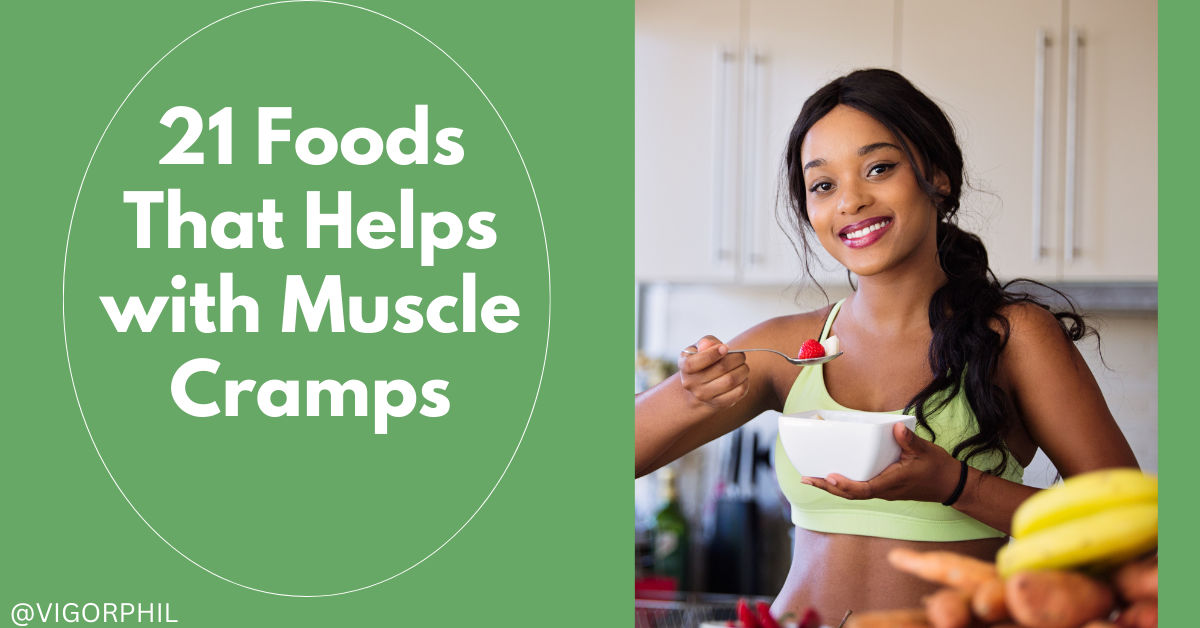Muscle cramps can be a frustrating and painful experience for many people. They can occur at any time and can be caused by a variety of factors, including exercise, dehydration, and electrolyte imbalances. Fortunately, there are certain foods that may help alleviate muscle cramps and improve overall muscle health. Here are 21 foods to consider incorporating into your diet to help with muscle cramps:
1. Bananas
Bananas are a rich source of potassium, a mineral that plays a crucial role in muscle function. Potassium helps to regulate the balance of fluids in the body, which is important for proper muscle and nerve function. Adequate potassium intake can help to prevent muscle cramps, spasms, and weakness.
Additionally, bananas are also a good source of carbohydrates, which provide energy for muscle contractions and help to prevent fatigue. They are also a good source of vitamin B6, which helps in the production of hemoglobin, a protein in red blood cells that carries oxygen to the muscles. Due to their high nutritional value and easy availability, bananas can be a convenient and healthy food choice for those looking to support muscle function and prevent cramps
2. Sweet potatoes
Sweet potatoes are high in potassium and also contain magnesium, which is another mineral that plays a role in muscle health. Sweet potatoes are a healthy vegetable that are high in potassium, calcium, and magnesium, all of which are vital for muscle function. Eating sweet potatoes can help increase your intake of these minerals, and may help prevent muscle cramps.
3. Spinach
Spinach is a leafy green vegetable that is an excellent source of several nutrients that are important for muscle function and cramp prevention. Spinach is rich in magnesium, a mineral that plays a crucial role in muscle function by helping to regulate muscle contractions and relaxations.
Adequate intake of magnesium can help to prevent muscle cramps and spasms. Spinach is also a good source of potassium, another mineral that is important for muscle function. Potassium helps to regulate the balance of fluids in the body, which is important for proper muscle and nerve function. Additionally, Spinach is also a good source of iron, which is essential for the production of hemoglobin, a protein in red blood cells that carries oxygen to the muscles.
This helps to prevent muscle fatigue, weakness and cramps. Spinach also contains antioxidants that help to protect muscles from damage. Due to its high nutritional value and easy availability, spinach can be a convenient and healthy food choice for those looking to support muscle function and prevent cramps.
4. Salmon
Salmon is a good source of omega-3 fatty acids, which can help reduce inflammation and improve muscle function. Salmon is a rich source of protein, healthy fats, and other nutrients that can help prevent muscle cramps. These include B vitamins, potassium, magnesium, and phosphorus.
Additionally, salmon is high in iron, which is important for healthy blood cell production, oxygenation of muscle tissue, and blood flow. It is also a good source of vitamin D, which is important for muscle function and may help prevent muscle cramps. Wild-caught salmon is a particularly good source of vitamin D, and is a smart choice for those looking to increase their intake of this nutrient.
5. Quinoa
Quinoa is a nutrient-dense, gluten-free grain that is a good source of several nutrients that are important for muscle function and cramp prevention. Quinoa is a good source of magnesium, a mineral that plays a crucial role in muscle function by helping to regulate muscle contractions and relaxations.
Adequate intake of magnesium can help to prevent muscle cramps and spasms. Quinoa is also a good source of protein, which is essential for muscle repair and growth. The protein in quinoa is also a complete protein, meaning that it contains all of the essential amino acids that the body needs. Additionally, Quinoa is a good source of potassium and iron, which also play an important role in muscle function and cramp prevention.
Potassium helps to regulate the balance of fluids in the body, which is important for proper muscle and nerve function. Iron is essential for the production of hemoglobin, a protein in red blood cells that carries oxygen to the muscles. This helps to prevent muscle fatigue, weakness and cramps. Due to its high nutritional value and easy availability, Quinoa can be a convenient and healthy food choice for those looking to support muscle function and prevent cramps.
6. Watermelon
Watermelon is a hydrating fruit that can help prevent muscle cramps due to its high water content. It is also rich in magnesium and potassium, two minerals that are important for muscle function.
Watermelon is a juicy and refreshing fruit that is a good source of several nutrients that are important for muscle function and cramp prevention. Watermelon is a good source of potassium, a mineral that plays a crucial role in muscle function by helping to regulate the balance of fluids in the body, which is important for proper muscle and nerve function. Adequate potassium intake can help to prevent muscle cramps, spasms, and weakness.
Watermelon is also a good source of antioxidants, specifically lycopene, which helps to protect muscles from damage caused by free radicals. Additionally, watermelon is also a good source of Vitamin C, which helps to protect muscles from inflammation and improve recovery time. It is also a good source of Vitamin A, which is important for maintaining healthy muscles and nerve function.
Watermelon is also high in water content, which can help to keep you hydrated and prevent muscle cramps caused by dehydration. Due to its high nutritional value and easy availability, watermelon can be a convenient and healthy food choice for those looking to support muscle function and prevent cramps. It can be consumed fresh, pickled or as a juice.
7. Papayas
Papayas are a tropical fruit that are a good source of several nutrients that are important for muscle function and cramp prevention. Papayas are a good source of potassium, a mineral that plays a crucial role in muscle function by helping to regulate the balance of fluids in the body, which is important for proper muscle and nerve function. Adequate potassium intake can help to prevent muscle cramps, spasms, and weakness.
Papayas are also a good source of vitamin C, an antioxidant that helps to protect muscles from damage caused by free radicals. Additionally, Papayas are a good source of Vitamin E, another antioxidant that helps to protect muscles from damage. Papayas also contain a digestive enzyme called papain, which can help to break down proteins and ease muscle soreness caused by intense workouts. Due to its high nutritional value and easy availability,
Papayas can be a convenient and healthy food choice for those looking to support muscle function and prevent cramps. Consuming more potassium-rich foods like papayas may help reduce the risk of muscle cramps. However, more research is needed in this area.
8. Leafy greens
Leafy greens are a group of vegetables that are packed with several nutrients that are important for muscle function and cramp prevention. They are an excellent source of magnesium, a mineral that plays a crucial role in muscle function by helping to regulate muscle contractions and relaxations. Adequate intake of magnesium can help to prevent muscle cramps and spasms.
Leafy greens such as spinach, kale, collard greens, and Swiss chard are also a good source of potassium, another mineral that is important for muscle function. Potassium helps to regulate the balance of fluids in the body, which is important for proper muscle and nerve function. They are also good source of Iron, Vitamin K, Vitamin C, Vitamin A and Vitamin E, all of which play an important role in muscle function and cramp prevention.
Leafy greens are also a good source of antioxidants that help to protect muscles from damage caused by free radicals. They are low in calories but high in fiber, which can help to keep you feeling full and satisfied. Due to their high nutritional value and easy availability, leafy greens can be a convenient and healthy food choice for those looking to support muscle function and prevent cramps. It’s important to note that leafy greens should be cooked or steamed as they contain oxalates that can cause formation of kidney stones.
9. Nuts and seeds
Nuts and seeds are a good source of several nutrients that are important for muscle function and cramp prevention. They are a good source of magnesium, a mineral that plays a crucial role in muscle function by helping to regulate muscle contractions and relaxations.
Adequate intake of magnesium can help to prevent muscle cramps and spasms. Nuts and seeds such as almonds, cashews, pumpkin seeds, and sunflower seeds are also a good source of potassium, another mineral that is important for muscle function. Potassium helps to regulate the balance of fluids in the body, which is important for proper muscle and nerve function.
They are also rich in healthy fats, and a good source of protein, which is essential for muscle repair and growth. They are also a good source of antioxidants that help to protect muscles from damage caused by free radicals. Additionally, nuts and seeds are also a good source of Vitamin E which also has antioxidant properties.
Nuts and seeds are also high in calories and should be consumed in moderation. They can be added to oatmeal, yogurt, salads, or eaten as a snack. They can also be used as a spread, like almond butter and seed butter, which can be added to sandwiches or used as dips. Due to their high nutritional value and easy availability, nuts and seeds can be a convenient and healthy food choice for those looking to support muscle function and prevent cramps.
10. Legumes
Legumes, such as beans, lentils, and peas, are a good source of several nutrients that are important for muscle function and cramp prevention. They are a good source of magnesium, a mineral that plays a crucial role in muscle function by helping to regulate muscle contractions and relaxations.
Adequate intake of magnesium can help to prevent muscle cramps and spasms. Legumes are also a good source of potassium, another mineral that is important for muscle function. Potassium helps to regulate the balance of fluids in the body, which is important for proper muscle and nerve function.
Legumes are also a good source of protein, which is essential for muscle repair and growth. They also contain high amounts of dietary fibers, which can help to support digestion and bowel regularity. Legumes are also a good source of iron, which is essential for the production of hemoglobin, a protein in red blood cells that carries oxygen to the muscles. This helps to prevent muscle fatigue, weakness and cramps.
Legumes are also a good source of antioxidants that help to protect muscles from damage caused by free radicals. Due to their high nutritional value and easy availability, legumes can be a convenient and healthy food choice for those looking to support muscle function and prevent cramps. They can be consumed as a side dish, salad, soup, or added to pasta, rice and other dishes.
11. Whole grains
Whole grains, such as oats, quinoa, brown rice, and barley, are a good source of several nutrients that are important for muscle function and cramp prevention. They are a good source of magnesium, a mineral that plays a crucial role in muscle function by helping to regulate muscle contractions and relaxations.
Adequate intake of magnesium can help to prevent muscle cramps and spasms. Whole grains are also a good source of potassium, another mineral that is important for muscle function. Potassium helps to regulate the balance of fluids in the body, which is important for proper muscle and nerve function.
Whole grains are also a good source of complex carbohydrates, which provide energy for muscle contractions and help to prevent fatigue. They also contain high amounts of dietary fibers, which can help to support digestion and bowel regularity. Whole grains are also a good source of protein, which is essential for muscle repair and growth. Additionally, whole grains are a good source of antioxidants that help to protect muscles from damage caused by free radicals.
Whole grains are also a good source of B-vitamins, which help the body convert food into energy and assist in the formation of red blood cells, which are responsible for carrying oxygen to the muscles. Consuming whole grains can also help with weight management which is important for muscle health as excess weight can put a strain on muscles.
Due to their high nutritional value and easy availability, whole grains can be a convenient and healthy food choice for those looking to support muscle function and prevent cramps. They can be consumed in the form of cereals, pasta, bread, and as a side dish. It’s important to choose whole grains over refined grains as whole grains retain most of the nutrients and fibers.
12. Berries
Berries such as strawberries, blueberries, and raspberries are a good source of antioxidants, which can help reduce inflammation and improve muscle function.
Berries such as blueberries, strawberries, raspberries, and blackberries are a good source of several nutrients that are important for muscle function and cramp prevention. They are a good source of antioxidants that help to protect muscles from damage caused by free radicals. Berries are also a good source of Vitamin C, which helps to protect muscles from inflammation and improve recovery time.
Berries are also a good source of potassium, a mineral that plays a crucial role in muscle function by helping to regulate the balance of fluids in the body, which is important for proper muscle and nerve function. Adequate potassium intake can help to prevent muscle cramps, spasms, and weakness. Berries are also a good source of flavonoids and anthocyanins, which have anti-inflammatory properties and may help to reduce muscle soreness and fatigue.
Berries are also a good source of fibers and low in calories, making them a great addition to a healthy diet. They can be consumed fresh, frozen or in the form of jams, jellies, syrups, and dried berries. Due to their high nutritional value and easy availability, berries can be a convenient and healthy food choice for those looking to support muscle function and prevent cramps.
13. Coconut water
Coconut water is a great source of electrolytes, which can help prevent muscle cramps and improve hydration. Coconut water is an effective way for athletes to replenish electrolytes and rehydrate after intense exercise. It contains a variety of electrolytes, including calcium, potassium, sodium, magnesium, and phosphorus, which may help reduce muscle cramping. Studies have shown that when athletes rehydrate with coconut water, they are less susceptible to muscle cramps than when they hydrate with regular water.
14. Tomatoes
Tomatoes are a good source of potassium and also contain antioxidants, which can help reduce inflammation and improve muscle function.
Tomatoes are a good source of several nutrients that are important for muscle function and cramp prevention. They are a good source of potassium, a mineral that plays a crucial role in muscle function by helping to regulate the balance of fluids in the body, which is important for proper muscle and nerve function. Adequate potassium intake can help to prevent muscle cramps, spasms, and weakness. Tomatoes are also a good source of lycopene, an antioxidant that helps to protect muscles from damage caused by free radicals.
Tomatoes are also a good source of Vitamin C, which helps to protect muscles from inflammation and improve recovery time. Additionally, Tomatoes are a good source of Vitamin A, which is important for maintaining healthy muscles and nerve function. They are also low in calories and high in water content, which can help to keep you hydrated and prevent muscle cramps caused by dehydration.
Tomatoes can be consumed fresh, canned, or in the form of sauces, soups, and juices. Due to their high nutritional value and easy availability, tomatoes can be a convenient and healthy food choice for those looking to support muscle function and prevent cramps.
15. Avocados
Avocados are a good source of healthy fats and also contain potassium, which can help prevent muscle cramps. Avocados are a great source of potassium and magnesium, both of which act as electrolytes and play important roles in muscle health. When electrolytes become imbalanced, muscle cramping can occur. Eating avocados can help maintain electrolyte balance, and may help prevent muscle cramps.
16. Turmeric
Turmeric is a spice that contains curcumin, which has anti-inflammatory properties that can help reduce muscle pain and soreness.
Turmeric is a spice that is commonly used in Indian and Middle Eastern cuisine, and is also known for its medicinal properties. Turmeric contains a compound called curcumin, which has anti-inflammatory and antioxidant properties that may help with muscle function and cramp prevention. Inflammation can cause muscle pain, soreness and weakness, by reducing inflammation, curcumin may help in reducing muscle pain and soreness. Additionally, the antioxidant properties of curcumin may help to protect muscles from damage caused by free radicals. Studies also suggest that curcumin may help to reduce muscle damage caused by exercise, and accelerate muscle recovery.
Turmeric can be used as a spice in cooking or as a supplement, it is important to note that the curcumin content in turmeric is around 3-5% by weight, so using supplements with curcuminoids or the use of black pepper extract (piperine) with turmeric can increase its bioavailability. However, more research is needed to confirm the effects of turmeric on muscle function and cramp prevention. It’s important to consult with a healthcare professional before adding turmeric supplements or large amount of turmeric in your diet, especially if you’re on medication or have certain health conditions.
17. Ginger
Ginger is a root that is commonly used in cooking, and also known for its medicinal properties. Ginger contains compounds like gingerol and shogaol which have anti-inflammatory and antioxidant properties that may help with muscle function and cramp prevention. Inflammation can cause muscle pain, soreness, and weakness, by reducing inflammation, ginger may help to reduce muscle pain and soreness.
Additionally, the antioxidant properties of ginger may help to protect muscles from damage caused by free radicals. Some studies suggest that ginger may help to reduce muscle damage caused by exercise, and accelerate muscle recovery.
Ginger can be used in cooking or as a supplement, it’s important to note that the gingerol and shogaol content in ginger can vary depending on the quality and origin of the ginger. It’s also important to consult with a healthcare professional before adding ginger supplements or large amount of ginger in your diet, especially if you’re on medication or have certain health conditions.
Moreover, ginger may also help to prevent muscle cramps by increasing circulation and reducing muscle tension. Drinking ginger tea or adding ginger to your meals may help to provide relief from muscle cramps. However, more research is needed to confirm the effects of ginger on muscle function and cramp prevention.
18. Beet greens
Beet greens, the leafy tops of the beet plant, are packed with nutrients that support muscle health and may reduce the risk of muscle cramps. They are rich in potassium, magnesium, calcium, phosphorus, B vitamins and nitrates, which help improve blood vessel function and optimize blood flow to the muscles.
19. Olive oil
Olive oil contains healthy fats and also contains antioxidants which can help reduce inflammation and improve muscle function.
Olive oil is a healthy fat that is important for muscle function and cramp prevention. It is a rich source of monounsaturated fats, which have been shown to have anti-inflammatory properties. Inflammation can cause muscle pain, soreness, and weakness, and by reducing inflammation, olive oil may help in reducing muscle pain and soreness. Additionally, olive oil is also a good source of antioxidants, which protect the body from free radicals and can help to protect muscles from damage.
Olive oil is also a good source of Vitamin E, which is a powerful antioxidant that helps to protect muscles from damage caused by free radicals. Vitamin E is also important for maintaining healthy muscles and nerve function. Additionally, olive oil is a good source of polyphenols, which are plant-based compounds that have anti-inflammatory properties and can help to protect muscles from damage.
Olive oil can be used in cooking or as a salad dressing, it’s important to note that the quality of olive oil can vary, it is best to choose extra virgin olive oil which has the most beneficial properties. It’s also important to consume it in moderation, as it’s high in calories, and excessive consumption can contribute to weight gain.
In summary, olive oil is a healthy fat that can help to support muscle function and prevent cramps by providing anti-inflammatory and antioxidant properties. Due to its high nutritional value and easy availability, olive oil can be a convenient and healthy food choice for those looking to support muscle function and prevent cramps.
20. Smoothies
Smoothies are an excellent choice for people who experience muscle cramps. They can be customized to deliver a hearty dose of muscle-supporting nutrients and prevent cramps by ensuring proper hydration and fueling the body. Combining ingredients such as frozen berries, spinach, almond butter, and Greek yogurt in a smoothie can provide the vitamins and minerals that muscles need to function optimally.
21. Water
Staying hydrated is important for muscle function, and drinking enough water can help prevent muscle cramps. Water is essential for muscle function because it helps to regulate body temperature, transport nutrients, and remove waste products. When muscles do not have enough water, they can become fatigued and cramps can occur.
Additionally, dehydration can also increase the risk of heat-related illnesses during exercise. To prevent muscle cramps and maintain proper muscle function, it is important to drink enough water and stay hydrated throughout the day. This can be done by drinking water regularly, especially during and after exercise, and by eating foods with high water content.
In conclusion, It’s important to note that muscle cramps can be caused by a variety of factors, and incorporating these foods into your diet may not completely eliminate the problem. It’s always best to consult with your doctor or a dietitian if you are experiencing frequent muscle cramps. Additionally, these foods should be combined with a balanced diet.












